2014年职称英语 阅读理解(41) +Too Little for Global Warming
- 格式:pdf
- 大小:169.03 KB
- 文档页数:4
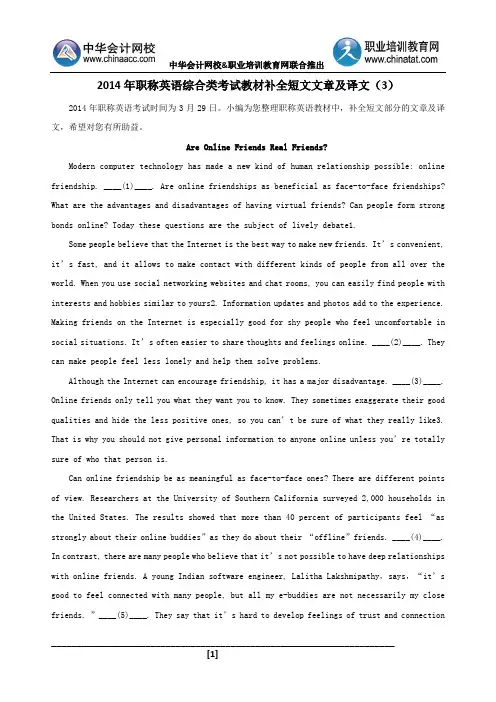
2014年职称英语综合类考试教材补全短文文章及译文(3)2014年职称英语考试时间为3月29日。
小编为您整理职称英语教材中,补全短文部分的文章及译文,希望对您有所助益。
Are Online Friends Real Friends?Modern computer technology has made a new kind of human relationship possible: online friendship. ____(1)____. Are online friendships as beneficial as face-to-face friendships? What are the advantages and disadvantages of having virtual friends? Can people form strong bonds online? Today these questions are the subject of lively debate1.Some people believe that the Internet is the best way to make new friends. It’s convenient, it’s fast, and it allows to make contact with different kinds of people from all over the world. When you use social networking websites and chat rooms, you can easily find people with interests and hobbies similar to yours2. Information updates and photos add to the experience. Making friends on the Internet is especially good for shy people who feel uncomfortable in social situations. It’s often easier to share thoughts and feelings online. ____(2)____. They can make people feel less lonely and help them solve problems.Although the Internet can encourage friendship, it has a major disadvantage. ____(3)____. Online friends only tell you what they want you to know. They sometimes exaggerate their good qualities and hid e the less positive ones, so you can’t be sure of what they really like3. That is why you should not give personal information to anyone online unless you’re totally sure of who that person is.Can online friendship be as meaningful as face-to-face ones? There are different points of view. Researchers at the University of Southern California surveyed 2,000 households in the United States. The results showed that more than 40 percent of participants feel “as strongly about their online buddies”as they do about their “offline”friends. ____(4)____. In contrast, there are many people who believe that it’s not possible to have deep relationships with online friends. A young Indian software engineer, Lalitha Lakshmipathy,says,“it’s good to feel connected with many people, but all my e-buddies are not necessarily my close friends. ”____(5)____. They say that it’s hard to develop feelings of trust and connectionwhen you don’t share experiences in person4.People continue to express different opinions about online friendship. However, most of them would agree that virtual friendships must not replace face-to-face friendships. As one life coach says, “a social networking site should only be the ‘add on’ in any relationship.”注释:1.Today these questions are the subject of lively debate.:现今这些问题成了人们热议的话题。
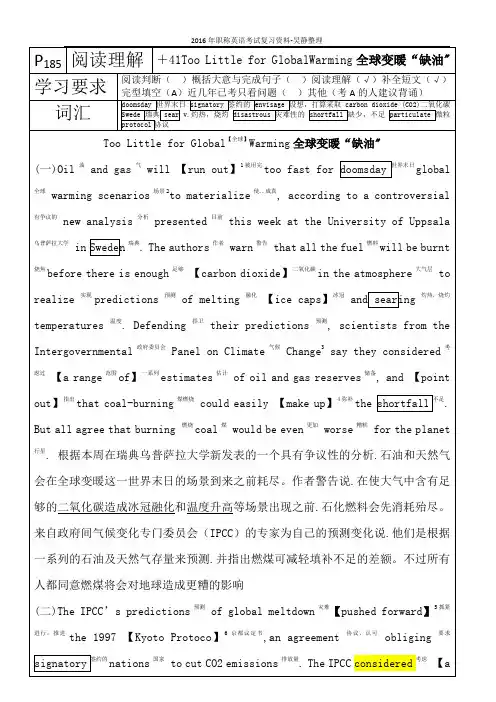

2014年职称英语考试真题及解析(理工类A)insane1.Both of the old man’s daughters were killed, and now he is goingA.sadB.mourningC.crazyD.revenge正确答案:C解析:老人的两个女儿都被杀死了,现在他快要疯了。
A 伤心B哀悼C 疯了D 报仇2.The teacher got annoyedwith him because his was always lateA.enjoyedB.connectedC.satisfiedD.upset正确答案:D解析:他总是迟到,这令他的老师很生气。
A 喜欢B 联系C 满意D 生气consequently3.The supermarket was closed, and they returned home with empty handsA.conciselyB.eloquentlyC.as a resultD.frequently正确答案:C解析:超市关门了,结果他们只能空手而归。
A 简明地 B 雄辩地 C 结果D频繁地foliage4.The park is famous for the autumnA.weatherB.harvestC.festivalsD.leaves正确答案:D解析:那个公园以秋叶闻名。
A 天气,气候B收获C节日D叶子fruitful5.The scientific work in the past ten years turns outA.blindpleteC.productiveD.careful解析:十年来的科学工作结果硕果累累。
A 盲的B 完整的C 有收获的D 仔细的dog than the wolf6.Of all the wild dogs, none is more closely related to the domesticatedA.ordinaryB.tameC.faithfulD.hunting正确答案:B解析:所有的野狗都没有狼与家狗的关系密切。
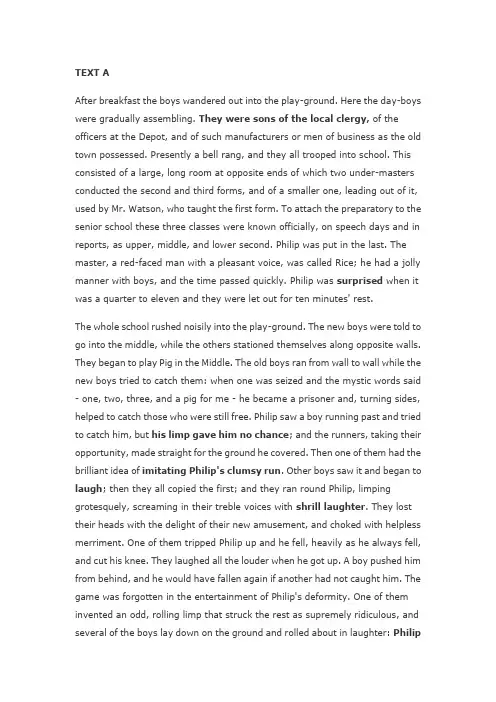
TEXT AAfter breakfast the boys wandered out into the play-ground. Here the day-boys were gradually assembling. They were sons of the local clergy, of the officers at the Depot, and of such manufacturers or men of business as the old town possessed. Presently a bell rang, and they all trooped into school. This consisted of a large, long room at opposite ends of which two under-masters conducted the second and third forms, and of a smaller one, leading out of it, used by Mr. Watson, who taught the first form. To attach the preparatory to the senior school these three classes were known officially, on speech days and in reports, as upper, middle, and lower second. Philip was put in the last. The master, a red-faced man with a pleasant voice, was called Rice; he had a jolly manner with boys, and the time passed quickly. Philip was surprised when it was a quarter to eleven and they were let out for ten minutes' rest.The whole school rushed noisily into the play-ground. The new boys were told to go into the middle, while the others stationed themselves along opposite walls. They began to play Pig in the Middle. The old boys ran from wall to wall while the new boys tried to catch them: when one was seized and the mystic words said - one, two, three, and a pig for me - he became a prisoner and, turning sides, helped to catch those who were still free. Philip saw a boy running past and tried to catch him, but his limp gave him no chance; and the runners, taking their opportunity, made straight for the ground he covered. Then one of them had the brilliant idea of imitating Philip's clumsy run. Other boys saw it and began to laugh; then they all copied the first; and they ran round Philip, limping grotesquely, screaming in their treble voices with shrill laughter. They lost their heads with the delight of their new amusement, and choked with helpless merriment. One of them tripped Philip up and he fell, heavily as he always fell, and cut his knee. They laughed all the louder when he got up. A boy pushed him from behind, and he would have fallen again if another had not caught him. The game was forgotten in the entertainment of Philip's deformity. One of them invented an odd, rolling limp that struck the rest as supremely ridiculous, and several of the boys lay down on the ground and rolled about in laughter: Philipwas completely scared. He could not make out why they were laughing at him. His heart beat so that he could hardly breathe, and he was more frightened than he had ever been in his life. He stood still stupidly while the boys ran round him, mimicking and laughing; they shouted to him to try and catch them; but he did not move. He did not want them to see him run any more. He was using all his strength to prevent himself from crying.TEXT BFor parents who send thei r kids off to college saying, “These will be the best years of your life,” it would be very appropriate to add, “If you can handle the stress of college life.”Freshmen are showing up already stressed out, according to the latest CIRP Freshman Survey that reported students' emotional health levels at their lowest since the survey started in 1985. While in school, more students are working part-time and near-full-time jobs. At graduation, only 29 percent of seniors have jobs lined up.Pressure to excel often creates stress, and many students are not learning how to effectively handle this stress.1) Stress can make smart people do stupid things: Stress causes what brain researchers call “cortical inhibition.” In simple terms, stress inhibits a part of the brain responsible for decision-making and reaction time and can adversely affect other mental abilities as well.2) The human body doesn't discriminate between a big stressful event and a little one: Any stressful experience will create a cascade of 1,400 biochemical events in your body. If any amount of stress is left unchecked, many things can occur within the body, including premature aging, impaired cognitive function and energy drain.3) Stress can become your new norm: When you regularly experience negative feelings and high amounts of stress, your brain recognizes this as yournormal state. This then becomes the new norm, or baseline for your emotional state.4) Stress can be controlled: Countless studies demonstrate that people can restructure their emotional state using emotion-refocusing techniques. These techniques help you recognize how you are feeling and shift to a more positive emotional, mental and physical state.5) Stress less by loving what you study: Barbara Frederickson, a leading international authority on the importance of positive emotions, says humans are genetically programmed to seek positive emotions such as love and joy. It's suggested to choose a major or career path you love and enjoy. Otherwise, you could end up fighting against your own biology.TEXT CFor anyone who doubts that the texting revolution is upon us, consider this: The average 13- to 17-year-old sends and receives 3,339 texts a month—more than 100 per day, according to the Nielsen Co., the media research firm. Adults are catching up. People from ages 45 to 54 sent and received 323 texts a month in the second quarter of 2010, up 75% from a year ago, Nielsen says.Behind the texting explosion is a fundamental shift in how we view our mobile devices. That they are phones is increasingly beside the point.Part of what's driving the texting surge among adults is the popularity of social media. Sites like Twitter, with postings of no more than 140 characters, are creating and reinforcing the habit of communicating in micro-bursts. And these sites also are pumping up sheer volume. Many Twitter and Facebook devotees create settings that alert them, via text message, every time a tweet or message is earmarked for them. In October 2009, 400 million texts alerted social-media users to such new messages across AT&T's wireless network, says Mark Collins, AT&T senior vice president for data and voice products; by September 2010, the number had more than doubled to one billion. (Twitter reports more than two billion tweets are sent each month.)。
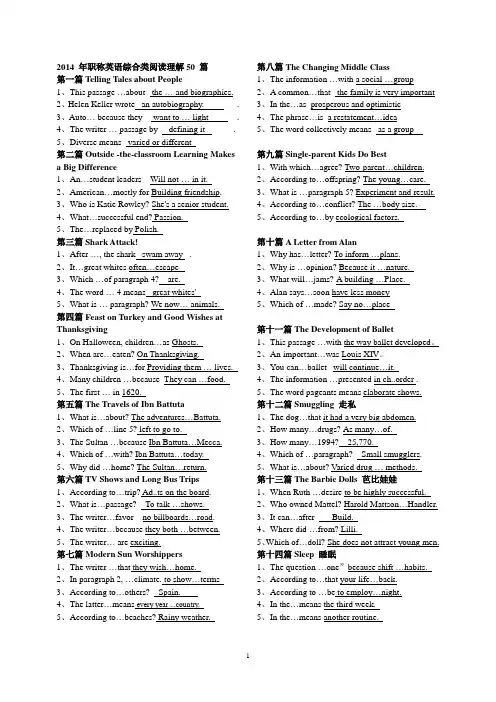
2014 年职称英语综合类阅读理解50 篇第一篇Telling Tales about People1、This passage …about_ the … and biographies.2、Helen Keller wrote_ an autobiography. _______.3、Auto… because they__ want to … light ______.4、The writer … passage by__ defining it ______.5、Diverse means_ varied or different第二篇Outside -the-classroom Learning Makesa Big Difference1、An…student leaders Will not … in it.2、American…mostly for Building friendship.3、Who is Katie Rowley? She's a senior student.4、What…successful end? Passion.5、The…replaced by Polish.第三篇Shark Attack!1、After …, the shark_ swam away _.2、It…great whites often…escape _3、Which …of paragraph 4? are.4、The word … 4 means_ great whites'_5、What is … paragraph? We now… animals.第四篇Feast on Turkey and Good Wishes at Thanksgiving1、On Halloween, children…as Ghosts.2、When are…eaten? On Thanksgiving.3、Thanksgiving is…for Providing them … lives.4、Many children …because_They can …food.5、The first … in 1620.第五篇The Travels of Ibn Battuta1、What is…about? The adventures…Battuta.2、Which of …line 5? left to go to.3、The Sultan …because Ibn Battuta…Mecca.4、Which of …with? Ibn Battuta…today.5、Why did …home? The Sultan…return.第六篇TV Shows and Long Bus Trips1、According to…trip? Ad..ts on the board.2、What is…passage? To talk …shows.3、The writer…favor no billboards…road.4、The writer…because they both …between.5、The writer… are exciting.第七篇Modern Sun Worshippers1、The writer …that they wish…home.2、In paragraph 2, …climate. to show…terms3、According to…others? Spain.4、The latter…means every year ...country.5、According to…beaches? Rainy weather.第八篇The Changing Middle Class1、The information …with a social …group2、A common…that_ the family is very important3、In the…as_prosperous and optimistic4、The phrase…is_a restatement…idea5、The word collectively means_ as a group第九篇Single-parent Kids Do Best1、With which…agree? Two-parent…children.2、According to…offspring? The young…care.3、What is …paragraph 5? Experiment and result.4、According to…conflict? The …body size.5、According to…by ecological factors.第十篇A Letter from Alan1、Why has…letter? To inform …plans.2、Why is …opinion? Because it …nature.3、What will…jams? A building …Place.4、Alan says…soon have less money5、Which of …made? Say no…place第十一篇The Development of Ballet1、This passage …with the way ballet developed。
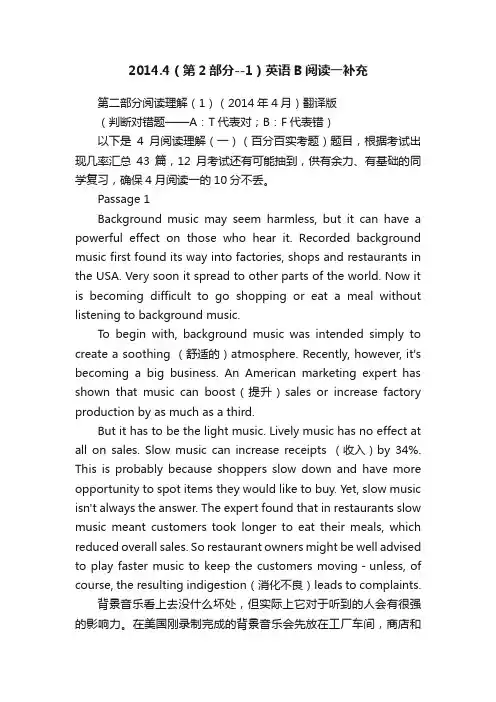
2014.4(第2部分--1)英语B阅读一补充第二部分阅读理解(1)(2014年4月)翻译版(判断对错题——A:T代表对;B:F代表错)以下是4月阅读理解(一)(百分百实考题)题目,根据考试出现几率汇总43篇,12月考试还有可能抽到,供有余力、有基础的同学复习,确保4月阅读一的10分不丢。
Passage 1Background music may seem harmless, but it can have a powerful effect on those who hear it. Recorded background music first found its way into factories, shops and restaurants in the USA. Very soon it spread to other parts of the world. Now it is becoming difficult to go shopping or eat a meal without listening to background music.To begin with, background music was intended simply to create a soothing (舒适的)atmosphere. Recently, however, it's becoming a big business. An American marketing expert has shown that music can boost(提升)sales or increase factory production by as much as a third.But it has to be the light music. Lively music has no effect at all on sales. Slow music can increase receipts (收入)by 34%. This is probably because shoppers slow down and have more opportunity to spot items they would like to buy. Yet, slow music isn't always the answer. The expert found that in restaurants slow music meant customers took longer to eat their meals, which reduced overall sales. So restaurant owners might be well advised to play faster music to keep the customers moving-unless, of course, the resulting indigestion(消化不良)leads to complaints.背景音乐看上去没什么坏处,但实际上它对于听到的人会有很强的影响力。
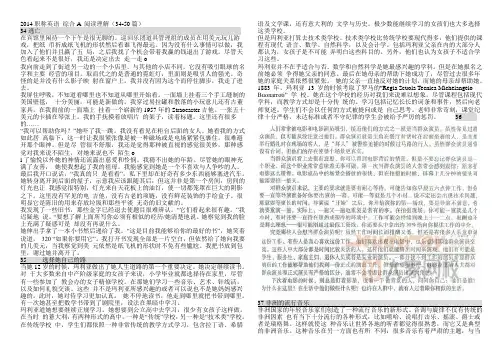
2014职称英语综合A 阅读理解(34-50篇)34逃亡在宾馆里闲待一个下午是很无聊的。
巡回乐团道具管理组的成员在用美元玩儿游戏,把纸币折成纸飞机的形状然后看谁飞得最远。
因为没有什么事情可以做,我加入了他们并且贏了五局,之后我找了个机会带着我贏的钱退出了游戏。
尽管天色看起来不是很好,我还是决定出去走一走o我向前走到了街道另一边的一个小店里。
与其他的小店不同,它没有吸引眼球的名字和主要经营的项目,取而代之的是普通的霓虹灯,里面则是吸引人的强光。
奇怪的是并没有什么影子映射在窗户上。
我并没有因为这个而停住脚步,我走了进去。
我屏住呼吸,不知道看哪里也不知道从哪里开始看。
一面墙上挂着三个手工缝制的美国壁毯,十分美丽,可能是新做的。
我穿过易拉罐和散落的小玩意儿还有古董家具,在我面前的一面墙上挂着一个崭新的1957年的Straocaster吉他。
一张五十美元的卡插在琴弦上。
我的手抚摸着放唱片的架子,读着标题。
这里还有很多的……“我可以帮助你吗?”她吓了我一跳。
我没有看见在柜台后面的女人。
她看我的方式如此居高临下,这一时让我很紧张像是被一种磁场或是电场紧紧包裹住。
很难避开那个眼神。
但是尽管很不舒服,我还是觉得那种被直视的感觉很美妙,那种感觉对我来说不陌生,对她来说也不陌生oi了愉悦以外她的神情还流露出慈爱和怜悯。
我猜不出她的年龄。
尽管她的眼神充满了友善,她使我想起了我的祖母。
我能感觉到她是一个不喜欢与人争吵的人。
最后我开口说话,“我真的只是看看”,私下里却在好奇有多少东西能够塞进汽车。
她转身离开到后面的屋子,示意我应该跟随其后,但这并非是第一个房间,房间的灯光也让我感觉很特别,灯光来自天花板上的油饤,使一切都笼罩在巨大的阴影之下。
这里没有罕见的电吉他,没有古老的项链,没有鲜花装饰的手绘盒子。
很明显它是陈旧的用来存放垃圾和那些平淡无奇的旧文献的。
我发现了一些旧书,那些金字巳经退去使题目很难辨认。
“它们看起来很有趣。
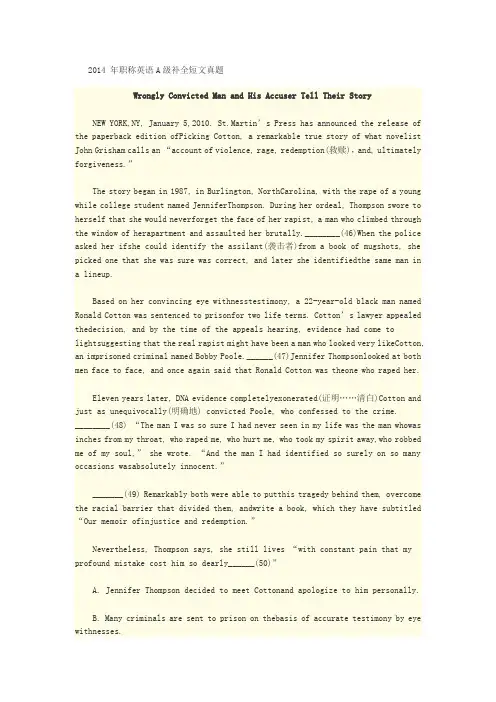
2014 年职称英语A级补全短文真题Wrongly Convicted Man and His Accuser Tell Their StoryNEW YORK,NY, January 5,2010. St.Martin’s Press has announced the release of the paperback edition ofPicking Cotton, a remarkable true story of what novelist John Grisham calls an “account of violence, rage, redemption(救赎),and, ultimately forgiveness.”The story began in 1987, in Burlington, NorthCarolina, with the rape of a young while college student named JenniferThompson. During her ordeal, Thompson swore to herself that she would neverforget the face of her rapist, a man who climbed through the window of herapartment and assaulted her brutally.________(46)When the police asked her ifshe could identify the assilant(袭击者)from a book of mugshots, she picked one that she was sure was correct, and later she identifiedthe same man in a lineup.Based on her convincing eye withnesstestimony, a 22-year-old black man named Ronald Cotton was sentenced to prisonfor two life terms. Cotton’s lawyer appealed thedecision, and by the time of the appeals hearing, evidence had come to lightsuggesting that the real rapist might have been a man who looked very likeCotton, an imprisoned criminal named Bobby Poole.______(47)Jennifer Thompsonlooked at both men face to face, and once again said that Ronald Cotton was theone who raped her.Eleven years later, DNA evidence completelyexonerated(证明……清白)Cotton and just as unequivocally(明确地) convicted Poole, who confessed to the crime.________(48) “The man I was so sure I had never seen in my life was the man whowas inches from my throat, who raped me, who hurt me, who took my spirit away,who robbed me of my soul,” she wrote. “And the man I had identified so surely on so many occasions wasabsolutely innocent.”_______(49) Remarkably both were able to putthis tragedy behind them, overcome the racial barrier that divided them, andwrite a book, which they have subtitled “Our memoir ofinjustice and redemption.”Nevertheless, Thompson says, she still lives “with constant pain that my profound mistake cost him so dearly______(50)”A. Jennifer Thompson decided to meet Cottonand apologize to him personally.B. Many criminals are sent to prison on thebasis of accurate testimony by eye withnesses.C. I cannot begin to imagine what would havehappened had my mistaken identification occurred in a capital caseD. Another trial was held.E. Thompson was shocked and devastated.F. During the attack, she made an effort tomemorize eveery detail of his face, looking for scars, tattoos(纹身),or other identifying marks.。
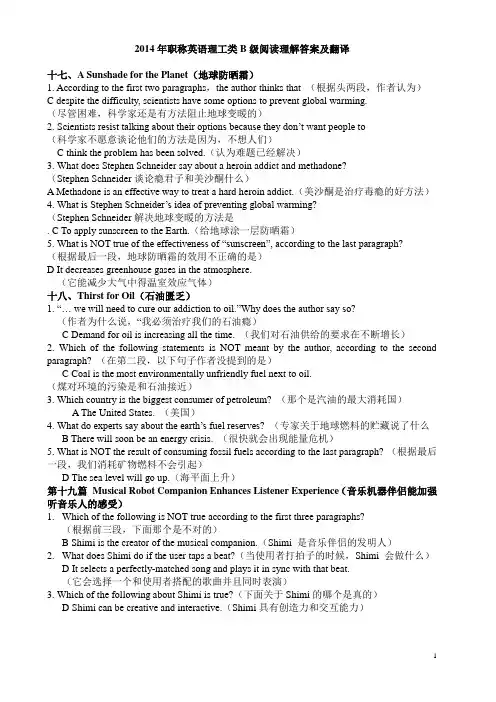
2014年职称英语理工类B级阅读理解答案及翻译十七、A Sunshade for the Planet(地球防晒霜)1. According to the first two paragraphs,the author thinks that (根据头两段,作者认为)C despite the difficulty, scientists have some options to prevent global warming.(尽管困难,科学家还是有方法阻止地球变暖的)2. Scientists resist talking about their options because they don’t want people to(科学家不愿意谈论他们的方法是因为,不想人们)C think the problem has been solved.(认为难题已经解决)3. What does Stephen Schneider say about a heroin addict and methadone?(Stephen Schneider谈论瘾君子和美沙酮什么)A Methadone is an effective way to treat a hard heroin addict.(美沙酮是治疗毒瘾的好方法)4. What is Stephen Schneider’s idea of preventing global warming?(Stephen Schneider解决地球变暖的方法是. C To apply sunscreen to the Earth.(给地球涂一层防晒霜)5. What is NOT true of the effectiveness of “sunscreen”, according to the last paragraph?(根据最后一段,地球防晒霜的效用不正确的是)D It decreases greenhouse gases in the atmosphere.(它能减少大气中得温室效应气体)十八、Thirst for Oil(石油匮乏)1. “… we will need to cure our addiction to oil.”Why does the author say so?(作者为什么说,“我必须治疗我们的石油瘾)C Demand for oil is increasing all the time. (我们对石油供给的要求在不断增长)2. Which of the following statements is NOT meant by the author, according to the second paragraph? (在第二段,以下句子作者没提到的是)C Coal is the most environmentally unfriendly fuel next to oil.(煤对环境的污染是和石油接近)3. Which country is the biggest consumer of petroleum? (那个是汽油的最大消耗国)A The United States. (美国)4. What do experts say about the earth’s fuel reserves? (专家关于地球燃料的贮藏说了什么B There will soon be an energy crisis. (很快就会出现能量危机)5. What is NOT the result of consuming fossil fuels according to the last paragraph? (根据最后一段,我们消耗矿物燃料不会引起)D The sea level will go up.(海平面上升)第十九篇Musical Robot Companion Enhances Listener Experience(音乐机器伴侣能加强听音乐人的感受)1.Which of the following is NOT true according to the first three paragraphs?(根据前三段,下面那个是不对的)B Shimi is the creator of the musical companion.(Shimi 是音乐伴侣的发明人)2.What does Shimi do if the user taps a beat?(当使用者打拍子的时候,Shimi 会做什么)D It selects a perfectly-matched song and plays it in sync with that beat.(它会选择一个和使用者搭配的歌曲并且同时表演)3. Which of the following about Shimi is true?(下面关于Shimi的哪个是真的)D Shimi can be creative and interactive.(Shimi具有创造力和交互能力)4. What does the author want to tell us?(作者要告诉我们什么)A The research center is developing a stronger and more versatile Shimi.(研究中心正在发明一种更强更多功能的Shimi.)5. Which of the following is Weinberg’s assertion?(下面哪一个是Weinberg的断言)B human lives will be filled with more fun if Shimi is going to arrive in homes.(Shimi如果走进家庭会给人们带来很多乐趣)二十、Explorer of the Extreme Deep(深海探究)1.What is Alvin? (Alvin是什么)C、A submersible.(一种潜水器)2.Which of the following statements is NOT a fact about Alvin?(下面那个不是关于Alvin的事实)A it can carry explorers as deep as 6,500 meters.(他能潜水深度为6500米)3.“...a world that is still full of mysteries” refers to(“对这个世界充满好奇”,指什么)C the ocean.(海洋)4.In what aspects are the new HOV and Alvin similar?(Alvin和新的HOV在那些方面是相似的)D Shape.(形状)5.In what aspects are the new HOV and Alvin different?( Alvin和新的HOV在那些方面是不同的)D Both A and B.(速度和视野)二十一、Plant Gas (植物沼气)(12年真题)1what was scientists' understanding of methane?(科学家怎么理解甲烷)C)It was produced in oxygen-free environments.(它是在无氧的环境下产生)2 To test whether plants are a source of methane, the scientists created(为了测试植物是否是甲烷生产的资源,科学家创造了)B)an environment with the same concentration of oxygen as the Earth has.(和地球上氧气浓度相同的环境)3 which statement is true of the methane emissions of plants in the experiment?(在下面句子中,关于在实验中植物的甲烷释放哪个是正确的)D)The higher the temperature, the greater the amount of methane emissions.(温度越高,甲烷的释放量越大)4 What of the following about methane is Not mentioned in the passage ?(关于甲烷下面哪个在短文中没有提及)D)Microbes in plants produce methane.(植物中的微生物能生产甲烷)5 What is the beneficial point of some microbes consuming plant-produced methane?(一些微生物可以消耗植物产生的甲烷有什么益处)C)Less methane reaches the atmosphere.(可以减少排放到空气中的甲烷量)二十二、Snowflakes(雪花)1.What does Professor Libbrecht believe to be true?(专家Libbrecht认为什么是真的)A. No two snowflakes are exactly the same in shape.(没有两片雪花在形状是完全一样2.What do the simplest snow crystals look like?(最简单的雪花晶体像什么)D. They are six-sided.(六边的)3.What are the factors that affect the shape and growth rate of a snow crystal?(影响雪花晶体形状和增长速率的是什么)A. Humidity and temperature.(湿度和温度).4. It can be felt from the description in the 2nd paragraph that the author(从第二段的描述中可以感觉出作者)A. admires the beauty of the snowflakes.(羡慕雪花的美)5. Libbrecht is not able to (Libbrecht不能)C. create snowflakes that are exactly alike.(制造出两片一模一样的雪花)二十三、Powering a city ?It’s a Breeze(风力发电,轻而易举)1.What are the symbols of Netherlands according to the first paragraph?(根据第一段,荷兰的象征是什么)B. Wooden shoes and wooden windmills.(木鞋和木风车)2. Which statement is best describes the urban turbine mentioned in the second paragraph?(在第二段中被提及的城市风车最好的描述是哪一个句子)B. It is a high-tech machine designed to generate energy for urban people.(它是一种为城市居民生产能量的高科技产品)3. The smallest models of an urban turbine(最小型的风车)B. weighs 2,000 kilograms.(重2000KG)4. The Netherlands leads in the urban turbine technology because(荷兰是现代风车技术的领军是因为)D. Netherlands is a small country with a large population.(荷兰是有着大量人口的小国)5. According to the last paragraph, what are the advantages of wind power technology?(根据最后一段,风力发电的优点是)D Both A and B(有很多用途而且可以安装在后院)二十四、Underground Coal Fires a Looming Catastrophe1. According to the first paragraph, one of the warnings given by the scientists is that(根据第一段,科学家给了什么警告)C. poisonous elements released by the underground fires can pollute water sources.(地下煤着火产生的有毒元素会污染水资源)2. According to the third paragraph, what will happen when the underground heat does not disappear?(根据第三段,地下热量不消失会发生什么)A. Coal heats up on its own and catches fire and burns.(煤温度升高达到燃点会着火或者爆炸)3. What did Stracher analyze in his article published in the International Journal of Coal Ecology?(Stracher分析他在the International Journal of Coal Ecology中发表的文章中分析)D. Coal fires can have an impact on the environment.(煤着火会对环境产生影响)4. Which of the following statements about Paul Van Dijk is Not true?(下面关于Paul Van Dijk哪个不是真的)B. He has detected and monitored underground fires in Netherlands.(他检测和见识荷兰的地下火)5. According to the fifth paragraph, what is the suggested method to control under ground fires?(根据第五段,被建议控制地下煤着火的方法是)D. Cutting off the oxygen supply.(切断氧气)二十五、Eat to live1.According to the passage, which of the following is NOT true?(根据短文,下面哪一个是不正确的)D. We have to begin dieting from childhood.(我们不得不从孩童时代开始节食)2. Why does the author mention an elderly mouse in paragraph 2?(为什么作者在第二段提到老年的老鼠)B. To illustrate the effect of meager food on mice.(为了描述节食对老鼠的影响)3. What can be inferred about completely normally fed mice mentioned in the passage?(从短文中正常进食的老鼠能推断什么)D. They are more likely to suffer from inflammation.(它们可能受到炎症的损害)3.According to the author, which of the following most interested the researchers?(根据作者观点,哪个更能引起研究者的兴趣)B. 27 of those 46 old genes that continued to behave like young genes.(哪些上了年纪的老鼠有27/46像年轻人那样保持活性)5. According to the last two paragraphs, Spindler believes that(根据最后两段,Spindler认为)C. dieting is not a good method to give us health and a long life.(节食不是得以健康长寿的好方法)二十六、Male and Female pilots cause accidents differently26.Male and Female Pilots Cause Accidents Differently(男女飞行员引起事故的差异)1.What is the research at Johns Hopkins University about?(Johns Hopkins University进行了什么研究)B) Gender difference in relation types of aircraft crashes.(性别差异与坠机类型的关系)2.Which of the statements is NOT true according to second paragraph?(根据第二段,哪个不是正确的)D) Only mature pilots are studied to determine the gender differences in the reasons for aircraft crash.(只研究成熟的飞行员来确定性别差异造成坠机的原因)3.How did the researchers carry out their study?(研究者如何进行研究)A) They studied the findings of several previous research projects.(它们对前几次的研究结果进行研究)4.What is the most common circumstance of crash with female pilots?(女飞行员最常见的坠机是什么原因)B) Loss of control on landing or take off and stalling.(起飞或降落时的失控和失速)5.In the comparison of female and male pilots.(对比男女飞行员)D) male pilots are found to make more errors in decision-making.(男飞行员更容易做出错误的决定)二十七、Driven to Distraction(分心驾驶)1.Which statement is true of the description in the first two paragraphs?(根据头两段,哪一个是对的描述)C. Coyne is not really driving so it is impossible for him to have hit the woman.(Coyne不是真的在开车,所以他是不可能撞到那个女人的)2.What do researchers want to find out, according to the third and fourth paragraphs?(根据三四段,研究者想发现什么)D. All of the above. (以上全对)3.What are the preliminary results given in the fifth paragraph?(第五段给出的初步结果是)C. In challenging driving situations, drivers do not have any additional mental energy to deal with something else.(在具有挑战性的环境下开车,司机是没有额外的精神去处理其他事情的)4. The sixth paragraph mainly state that the researchers.(第六段主要陈述研究者)D. want to determine the best ways of giving navigational information system.(想确定一个给司机导航系统的最好的方式)5. What kind of directions do men and women prefer?(男司机和女司机更倾向于哪一种导航)B. Men prefer more general directions and women prefer route direction.(男司机更喜欢笼统的导航,女司机更喜欢清晰路线)二十八、Sleep let brain File memories(睡觉使大脑分类记忆)1. Which of the following statements is nearest in meaning to the sentence "To sleep. Perchance to file?"?(下面哪个的意思更接近"To sleep. Perchance to file?"的意思)A Does brain arrange memories in useful order during sleep?(睡觉期间,对大脑按序安排记忆)2. What is the result of the experiment with rats and mice carried out at Rutgers University?(at Rutgers University对大鼠和小鼠进行试验的结果是)C Somatosensory neocortex and hippocampus work together in memory consolidation.(大脑皮层和海马状突起在整理记忆中一起工作)3. What is the relation of memory to glucose tolerance, as is indicated by a research mentioned in paragraph 4? (在第四段的研究中提及的,记忆和葡萄糖允许量有什么关系)D The poorer the memory, the poorer glucose tolerance.(葡萄糖允许量越小,记忆越差)4. In what way is memory related to hippocampus shrinkage?(记忆和海马状突起的缩小有什么关系)B The more hippocampus shrinks, the poorer one's memory.(海马状突起缩小越多,记忆越差)5. According to the last paragraph, what is the ultimate reason for going to the gym?(根据最后一段,去运动的最后理由是)D To control glucose levels. (控制葡萄糖的水平)二十九、I’ll Be Bach(我也能成为巴赫)1.The music composed by David cope is about ______.(David cope作的曲子是)A Classical music(经典音乐)2.By developing a computer software,David cope aimed ______.(David cope发明计算机软件的目的是,)C to write an opera(写一歌剧)3.What did cope realize about a great composer’s brain?(cope认识到伟大作曲家大脑什么)D It creates an accurate database(它创造了一个精确的数据库)4.Who is Emmy?(Emmy是谁)B a computer software (一个计算机软件)5.We can infer from the passage that ______.(从文章中,我们能推断出)D Emmy did much more work than a composer.(Emmy做的工作比作曲家多)三十、Digital Realm(数字王国,13年新增,未考)1. The techniques of voice recognition ?语音识别技术B are in its initial stage of development. (还处在雏形发展阶段)2. According to the second paragraph, when we reach the stage of artificial intelligence,(根据第二段,当我们达到人工智能阶段)A machines can be our agents us they understand our thoughts.(机器将通过了解我们的想法代理我们)3. What’s the best description of Gordon Moore’s law as mentioned in the third paragraph?(在第三段提及的Gordon Moore’s law的最好描述是)A It motivates the development of the digital world.(它将推动数字世界的发展)4. What can people do in a future scene as described in the fourth paragraph?(根据第四段描述,在未来世界人们能做什么)D All of the above.(以上都对)5. Which of the following statements is true of a personalized market?(关于个性化市场,下面哪个句子是对的)C In a personalized market, products are tailored to each consumer.(在个性化市场,产品按每一个消费者要求制作的)三十一、Hurricane Katrina(卡特里娜飓风)1. What is the eye of a hurricane?(什么是风眼)C) A calm central region of low pressure between 12 to 60 miles in diameter.(一个直径12-60米的低压中心平静区域)2. Which of the following is NOT the "requirements" mentioned in the second paragraph?(下面哪个不是在第二段中提及的条件)A) The tropical waters are warm and calm.(一个温暖平静的热带水面)3. Which of the following is the best explanation of the word "drive" in the third paragraph?(哪个是第三段中"drive"词的最好解释)C) To supply the motive force or power and cause to function.(提供动力,促进形成)4. What does the warm air mentioned in the fourth paragraph produce when it is rising from thesea surface?(第四段中提到的,暖空气在海面上升形成)B) Low pressure.(低压区)5. What is NOT true of Hurricane Katrina according to the last paragraph?(根据最后一段,关于卡特里娜飓风,那个不是正确的)D) The humanitarian crisis is as serious as that of the great depression(飓风危机像大萧条一样严重)三十二、Mind-reading1 Machine(读心机,09年真题)1. What is responsible for processing the information sent by your eyes?(什么负责处理眼睛传来的信息)C)Neurons in the brain.(大脑神经元)2. Which of the following statements is NOT meant by the writer?(哪个句子作者未提及)D)fMRI helps scientists to discover how the brain develops intelligently.(fMRI帮助科学家发现大脑如何智能开发)3. "Highlighting the areas of the brain at work" means(标出大脑工作区域,意味着A)"marking the parts of the brain that are processing information"4. What did the researchers experiment on?(研究人员用什么做实验)B)Two volunteers.(两名志愿者)5. Which of the following can be the best replacement of the title?(下面哪个是标题的最好替代)B)Your Thoughts Can Be Scanned. (你的想法可以被扫描)三十三、Experts Call for Local and Regional Control of Sites for Radioactive Waste(专家呼吁局部和区域控制发射性废物地点)1.Which of the following words can best substitute the word "withdrawal" in the firstparagraph? (下面哪一个词可以代替第一段中的单词"withdrawal")B Canceling. (中止)2.According to Rodney Ewing and Frand von Hippel, where to locate nuclear facilities(根据Rodney Ewing and Frand von Hippel所说,确定核废物地点)B should be approved by local people and states.(必须取得当地人们和政府的支持)3. What is NOT true about the 1987 decision by Congress concerning siting of nuclear waste disposal? (关于1987年国会确定核废物地址的问题,以下哪个不对)D The decision by Congress was accepted by local communities.(国会的决定被当地社区接受)4. What does the author of the essay in the fourth paragraph want to say?(在短文第四段,作者想说)C Efforts should be made to develop nuclear disposal sites to suit the circumstances of the region. (制定核废物地点应适应当地的环境)5. What is meant by "regional approach" as mentioned in the last paragraph?(最后一段中提及的"regional approach",是什么意思)A Waste disposal sites are located close to reactors and in places suitable for the regional circumstances. (废物处理地点应靠近反应堆,并且适合当地环境)。
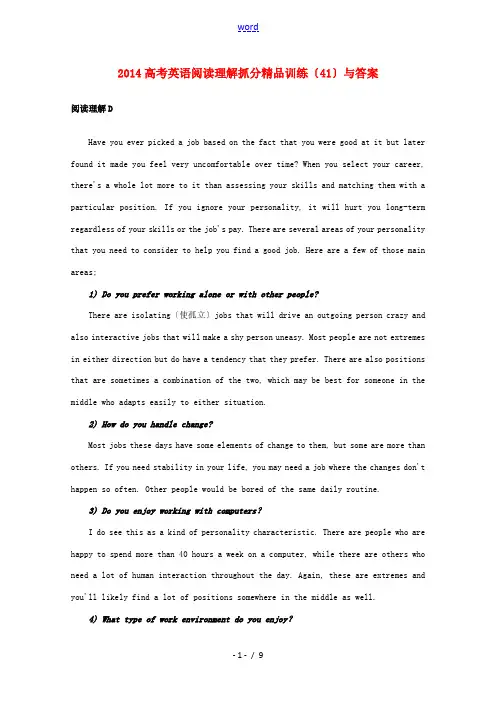
2014高考英语阅读理解抓分精品训练〔41〕与答案阅读理解DHave you ever picked a job based on the fact that you were good at it but later found it made you feel very uncomfortable over time? When you select your career, there's a whole lot more to it than assessing your skills and matching them with a particular position. If you ignore your personality, it will hurt you long-term regardless of your skills or the job's pay. There are several areas of your personality that you need to consider to help you find a good job. Here are a few of those main areas;1) Do you prefer working alone or with other people?There are isolating〔使孤立〕jobs that will drive an outgoing person crazy and also interactive jobs that will make a shy person uneasy. Most people are not extremes in either direction but do have a tendency that they prefer. There are also positions that are sometimes a combination of the two, which may be best for someone in the middle who adapts easily to either situation.2) How do you handle change?Most jobs these days have some elements of change to them, but some are more than others. If you need stability in your life, you may need a job where the changes don't happen so often. Other people would be bored of the same daily routine.3) Do you enjoy working with computers?I do see this as a kind of personality characteristic. There are people who are happy to spend more than 40 hours a week on a computer, while there are others who need a lot of human interaction throughout the day. Again, these are extremes and you'll likely find a lot of positions somewhere in the middle as well.4) What type of work environment do you enjoy?This can range from being in a large building with a lot of people you won't know immediately to a smaller setting where you'll get to know almost all the people there fairly quickly.5) How do you like to get paid?Some people are motivated by the pay they get, while others feel too stressed to be like that. The variety of payment designs in the sales industry is a typical example for this.Anyway, these are a great starting point for you. I've seen it over and over again with people that they make more money over time when they do something they love. It may take you a little longer, but making a move to do what you have a passion for can change the course of your life for the better.13. What is unnecessary in your job hunting?A. Assessing your skillsB. Going to different areasC. Matching your skills with a positionD. taking your personality into consideration14. Which of the following is TRUE according to the passage?A. Isolating jobs usually drive people mad.B. Interactive jobs make people shy easily.C. Extreme people tend to work with others.D. Almost everyone has a tendency in jobs.15. What is the missing word about a job search in the following chart?A. Design.B. Changes.C. Cooperation.D. Hobbies.16. What is the best title for this passage?A. Lifestyles and Job PayB. Jobs and EnvironmentC. Job Skills and AbilitiesD. Personalities and Jobs参考答案BDCBC8[2013·山东卷] CYou can't always predict a heavy rain or remember your umbrella. But designer Mikhail Belyaev doesn't think that forgetting to check the weather forecast before heading out should result in you getting wet. That's why he created Lampbrella, a lamp post with its own rain-sensing umbrella.The designer says he came up with the idea after watching people get wet on streets in Russia. “Once, I was driving on a central Saint Petersburg street and saw the street lamps lighting up people trying to hide from the rain. I thought it would be appropriate to have a canopy(伞篷)built into a street lamp,〞 he said.The Lampbrella is a standard-looking street lamp fitted with an umbrella canopy. It has a built-in electric motor which can open or close the umbrella on demand. Sensors(传感器)then ensure that the umbrella offers pedestrians shelter whenever it starts raining.In addition to the rain sensor, there's also a 360° motion sensor on the fiberglass street lamp which detects whether anyone is using the Lampbrella.After three minutes of not being used the canopy is closed.According to the designer, the Lampbrella would move at a relatively low speed, so as not to cause harm to the pedestrians. Besides, it would be grounded to protect from possible lightning strike. Each Lampbrella would offer enough shelter for severalpeople. Being installed(安装) at 2 meters off the ground, it would only be a danger for the tallest of pedestrians.While there are no plans to take the Lampbrella into production, Belyaev says he recently introduced his creation to one Moscow Department, and insists his creation could be installed on any street where a lot of people walk but there are no canopies to provide shelter.66. For what purpose did Belyaev create the Lampbrella?A. To predict a heavy rain.B. To check the weather forecast.C. To protect people from the rain.D. To remind people to take an umbrella.67.What do we know from Belyaev's words in Paragraph 2?A. His creation was inspired by an experience.B. It rains a lot in the city of Saint Petersburg.C. Street lamps are protected by canopies.D. He enjoyed taking walks in the rain.68.Which of the following shows how the Lampbrella works?A. motor→canopy→sensor sB. sensors→motor→canopyC. motor→sensors→canopyD. canopy→motor→sensors69.What does Paragraph 5 mainly tell us about the Lampbrella?A. Its moving speed.B. Its appearance.C. Its installation.D. Its safety.70.What can be inferred from the last paragraph?A. The designer will open a company to promote his product.B. The Lampbrella could be put into immediate production.C. The designer is confident that his creation is practical.D. The Lampbrella would be put on show in Moscow.【要点综述】这是一篇说明文。
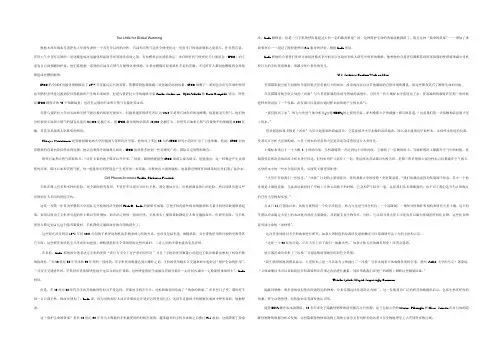
Too Little for Global Warming根据本周在瑞典乌普萨拉大学新发表的一个具有争议性的分析,石油和天然气会在全球变化这一世界末日的场景到来之前耗尽。
作者警告说,在使大气中含有足够的二氧化碳造成冰冠融化和温度升高等场景出现之前,石化燃料会先消耗殆尽。
来自政府间气候变化专门委员会(IPCC)的专家为自己的预测辩护说,他们是根据一系列的石油及天然气存量预估来预测,并指出燃煤可轻易填补不足的差额。
不过所有人都同意燃煤将会对地球造成更糟的影响。
IPCC的全球冰雪融化预测推动了1977年京都议定书的签署,签署国同意将缩减二氧化碳的总排放量。
IPCC预测了一系列包含从无节制的使用化石燃料至快速过渡到较环保能源所产生的未来场景。
但是乌普萨拉大学的地质学家Anders Sivertsson,Kjell Aieklett和Colin Campbell 表示,即使是IPCC最保守的40个预测场景,也没有足够的石油和天然气存量使其成真。
尽管乌普萨拉大学对石油和天然气储存量的估算差别很大,但越来越多的研究者认为2010年将使石油供应的高峰期,接着就是天然气。
他们的分析表明石油和天然气的储存总量在35,000亿桶左右。
而IPCC最乐观的估算在50,000亿桶左右。
对世界石油和天然气存量的平均预测是8,000亿桶,者甚至是瑞典人估算值的两倍。
Nebojsa Nakicenovic是奥地利维也纳大学的能源专家和经济学家。
他领导了多达80人的IPCC研究小组并作出了上述预测。
他说,IPCC对世界燃料的存量估算仍然站得住脚。
他认为和保守的瑞典人相比,IPCC的估算考虑到一些范围更广的、国际认定的燃料储存。
即使石油和天然气消耗殆尽,“还有大量的地下煤可以开开采,”他说,煤的燃烧能使IPCC的预言成为现实。
但他指出,这一转换会产生灾难性的后果。
煤比石油和天然气脏,每一能量单位的使用会产生更多的二氧化碳,并释放出大量的微粒。
2014年12月四级真题卷一答案解析D39.N)根据上下文这需要填入一个名词。
proportions “比例”,此处与前句构成对比,表示在科学、数学和工程领域方面的学位比例却在降低。
40.C)根据上下文这里要填入一个副词修饰形容词related,be related to“与…相关”,根据句意这里表示在科学、技术、工程、数学领域的学位数量较少与学龄儿童在这些方面的国际评估的较差的表现有关,两者的关系应该是比较密切的,closely“密切地”,符合句意。
41.E)根据上下文这里要填入一个名词,courses“课程”,此处表示数学补习课程。
42.B)根据上下文这里需要填入一个副词,actually“实际上”,这里起到强调作用,表示在计划学习科学或工程类专业的学生中实际上只有不超过一半的人能完成这一专业的学习。
43.I)根据上下文这里需要填入一个副词,especially “尤其是,特别是”此处表示尤其是在数学方面。
44. G) 根据上下文这需要填入一个形容词或现在分词修饰performance,declining “下降”,此处表示随着美国学生在数学和科学方面能力的日趋下降。
45. H) 根据上下文这里需要填入一个名词与earn构成搭配。
degree “学位”,earn degree“获得学位”,这里指发展中国家中越来越多的学生获得了STEM 学科的学位。
Section B46. B) 由题干中的people’s health, medical expenses可以定位到B)段中…that could spare millions of such people a lifetime of chronic (长期的) ill health, and at the same time save the National Health Service (NHS) at least £14 billion a year in England and Wales. 题干是对原文的同义转述。
2014年英语四级阅读真题及答案解析(12月)Part I WritingDirections: For this part, you are allowed 30 minutes to write a shor t essay on the following topic. You should write at least 120 words but no more than 180 words.作文题一:印象最深的活动AA campus activity that has benefited most.作文题二:印象最深的课程A course that has impressed you most in college.作文题三:印象最深的同学A classmate of yours who has influenced you most in college.Part II ListeningSection ADirections: In this section,you will hear 8 short conversations and 2 long conversations. At the end of each conversation, one or more questions will be asked about what was said. Both the conversation and the questions will be spoken only once. After each question there will be a pause. During the pause, you must read the four choices marked A) , B) , C) and D), and decide which is the best answer. Then mark the corresponding letter on Answer Sheet I with a single line through the centre.Question 1A.The man is not good at balancing his budget.B.She will go purchase the gift herself.C.The gift should not be too expensive.D.They are gonging to Jane's house-warming party.Question 2A.He is quite willing to give the woman a hand.B.It takes patience to go through the statistics.C.He has prepared the statistics for the woman.D.The woman should take a course in statistics.Question 3A.Page 55 is missing from the woman's scripts.B.They cannot begin their recording right away.C.The woman does not take the recording seriously.D.The man wants to make some changes in the scripts.Question 4A.The date of Carl's wedding.B.The birthday of Carl's bride.C.A significant event in July.D.Preparation for a wedding.Question 5A.The woman forgot to tell the man in advance.B.The man was absent from the weekly meeting.C.The woman was annoyed at the man's excuse.D.The man was in charge of scheduling meetings.Question 6A.The woman is a marvelous cook.B.The woman has just bought an oven.C.The man has to leave in half an hour.D.The man cannot want for his meal.Question 7A.How she can best help the man.B.Where the man got the bad news.C.What items sell well in the store.D.Whether the man can keep his job.Question 8A.The woman can sign up for a swimming class.B.He works in the physical education department.C.The woman has the potential to swim like a fish.D.He would like to teach the woman how to swim.Questions 9 to 11 are based on the conversation you have just heard. Question 9A.He teaches in a law school.B.He loves classical music.C.He is a diplomat.D.He is a wonderful lecturer.Question 10A.Went to see a play.B.Watched a soccer game.C.Took some photos.D.Attended a dance.Question 11A.She decided to get married in three years.B.Her mother objected to Eric’s flying lessons.C.She insisted that Eric pursue graduate studies.D.Her father said she could marry Eric right away.Questions 12 to 15 are based on the conversation you have just heard. Question 12A.Editor.B.Teacher.C.JournalistD.Typist.Question 13A.The beautiful Amazon rainforests.B.A new railway under construction.C.Big changes in the Amazon valley.D.Some newly discovered scenic spot.Question 14A.In news weeklies.B.In newspapers' Sunday editions.C.In a local evening paper.D.In overseas editions of U.S. magazines.Question 15A.To be employed by a newspaper.B.To become a professional writer.C.To sell her articles to a news service.D.To get her life story published soon.Section BDirections:In this section,you will hear 3 short passages. At the end of each passage,you will hear some questions. Both the passage and the questions will be spoken only once. After you hear a question,you must choose the best answer from the four choices marked A), B), C) and D). Then mark the corresponding letter on Answer Sheet I with a single line through the centre.Passage OneQuestions 16 to 18 are based on the passage you have just heard.Question 16A.Nodding one's head.B.Waving one's hand.C.Holding up the forefinger.D.Turning the right thumb down.Question 17A.Looking away from them.B.Forming a circle with fingers.C.Bowing one's head them.D.Waving or pointing to them.Question 18A.Looking one's superior in the eye.B.Keeping one's arms folded while talking.C.Showing the sole of one's foot to a guest.ing a lot of gestures during a conversation.Passage TwoQuestions 19 to 21 are based on the passage you have just heard.Question 19A.They had to beg for foot after the harvest.B.They grew wheat and corn on a small farm.C.They shared a small flat with their relatives.D.The children walked to school on dirt roads.Question 20A.Tour Ecuador's Andes Mountains.B.Earn an annual income of $2800.C.Purchase a plot to build a home on.D.Send their children to school.Question 21A.The achievements of the Trickle Up Program.B.A new worldwide economic revolution.C.Different forms of assistance to the needy.D.The life of poor people in developing countries.Passage ThreeQuestions 22 to 25 are based on the passage you have just heard.Question 22A.They are highly sensitive to cold.B.They are vitally important to our life.C.They are a living part of our body.D.They are a chief source of our pain.Question 23A.It has to be removed in time by a dentist.B.It is a rare oral disease among old people.C.It contains many nerves and blood vessels.D.It is sticky and colorless film on the teeth.Question 24A.It can change into acids causing damage to their outer covering.B.It greatly reduces their resistance to the attacks of bacteria.C.It makes their nerves and blood vessels more sensitive to acid food.D.It combines with food particles to form a film on their surface.Question 25A.Food particles.B.Gum disease.C.Unhealthy living habits.D.Chemical crosion.Section CStunt people(替身演员) are not movie stars, but they are the hidden heroes of many movies.They were around long before films. Even Shakespeare may have used them in fight scenes. To be good, a fight scene has to look real. Punches must (26)______ enemies' jaws. Sword fights must be fought with(27)______ swords. Several actors are usually in a fight scene. Their moves must be set up so that no one gets hurt. It is almost like planning a dance performance.If a movie scene is dangerous, stun people usually(28)______the stars. You may think you see Tom Cruise running along the top of a train. But it is(29)______ his stunt double. Stunt people must(30)______ the stars they stand in for. Their height and build should be about the same. But when close-ups are needed, the film(31)______ the star.Some stunt people(32)______ in certain kinds of scenes. For instance, a stunt woman named Jan Davis does all kinds of jumps. She has leapt from planes and even off the top of a waterfall. Each jump required careful planning and expert(33)______.Yakima Canutt was a famous cowboy stunt man. Among other stunts, he could jump from a second story window onto a horse's back. He(34)______ the famous trick of sliding under a moving stagecoach. Canuttalso(35)______ a new way to make a punch look real. He was the only stunt man ever to get an Oscar.Part III Reading Comprehension (40 minutes)Section ADirections:In this section, there is a passage with ten blanks. You are required to select one word for each blank from a list of choices given in a word bank following the passage. Read the passage through carefully before making your choices. Each choice in the bank is identified by a letter. Please mark the corresponding letter for each item on Answer Sheet 2 with a single line through the centre. You may not use any of the words in the bank more than once.For decades, Americans have taken for granted the XXXX development of new technologies. The innovations(创新)XXXX opment during World War II and afterwards were(36)_____ to the prosperity of the nation in the second half of the 20th century. Those innovations, upon which virtually all aspects of(37)_____ society now depend, were possible because the United States then(38)_____ the world in mathematics and science education. Today, however, despite increasing demand for workers with strong skills in mathematics and science, the(39)_____ of degrees awarded in science, math, and engineering are decreasing.The deeling in degree production in what are called the STEM disciplines(science, technology, engineering, and math.)seems tobe(40)_____related to the comparatively weak performance by U.S. schoolchildren on international assessments of math and science. Manystudents entering college have weak skills in mathematics. According to the 2005 report of the Business Higher Education Forum, 22 percent of college freshmen must take remediat(补习的)math(41)_____, and less than half of the students who plan to major in science orengineering(42)_____complete a major in those fields.The result has been a decrease in the number of American college graduates who have the skills, (43)_____ in mathematics, to power a workforce that can keep the country at the forefront(前言)of innovation and maintain its standard of living. With the(44)_____ performance of American students in math and science has come increased competition from students from other countries that have strongly supported education in these areas. Many more students earn(45)_____ in the STEM disciplines in developing countries than in the United States.A.acceleratingB.actuallyC.closelyD.contemporaryE.coursesF.criticalG.decliningH.degreesI.especiallyJ.futureK.ledL.metM.proceduresN.proportionsO.sphetesSection BDirections:In this section,you are going to read a passage with ten statements attached to it. Each statement contains information given in one of the paragraphs. Identify the paragraph from which the information is derived. You may choose a paragraph more than once. Each paragraph is marked with a letter. Answer the questions by marking the corresponding letter on Answer Sheet 2.Ban sugary drinks that will add fuel to the obesity war[A] On a train last Thursday, I sat opposite a man who was so fat he filled more than one seat. He was pale and disfigured and looked sick to death, which he probably was: obesity(肥胖的)leads to many nasty ways of dying. Looking around the carriage, I saw quite a few people like him,including a couple of fatty children with swollen checks pressing against their eyes. These people are part of what is without exaggeration an epidemic(流行病)of obesity.[B] But it is quite unnecessary: there is a simple idea- far from new- that could spare millions of such people a lifetime of chronic(长期的)ill health, and at the same time save the National Health Service(NHS)at least £14 billion a year in England and Wales. There would, you might think, be considerable public interest in it. This simple idea is that sugar is as good- or as bad- as poison and should be avoided. It is pure, white and deadly, as Professor John Yudkin described it 40 years ago in a revolutionary book of that name. The subtitle was How Sugar Is Killing Us.[C] In its countless hidden forms, in ready meals, junk food and sweet drinks, sugar leads to addiction(瘾), to hormonal upsets to the appetite, to metabolic(新陈代谢的)malfunctions and obesity and from there to type 2 diabetes(糖尿病)and its many horrible complication. If people really grasped that, they would try to kick the habit, particularly as Britain is the “ fat man of Europe” . They might even feel driven to support government measures to prevent people from consuming this deadly stuff. Yet so far this idea has met little but resistance.[D] It is not difficult to imagine the vested interests(既得利益集团)lined up against any sugar control- all the food and drink manufacturers, processors, promoters and retailers who make such easy pickings out of the magic powers of sugar. Then there are the liberals, with whom I would normally side, who protest that government regulation would be yet another instance of interference in our lives.[E]That is true, but people should realize that you cannot have a welfare state without a nanny state(保姆国家), to some degree. If we are all to be responsible for one another’s health insurance, through socialized medicine, then we are all closely involved in one another’s health, including everyone’s eating and drinking. That has already been admitted, finally, with smoking. But it has yet to be admitted with overeating, even though one in four adults in this country is obese and that number is predicted to double by the year 2050.Quite apart from anything else, obesity will cripple the NHS.[F]Recently, though, there have been signs that the medical establishment is trying to sound the alarm. Last month the Academy of Medical Royal Colleges(AMRC)published a report saying that obesity is the greatest public health issue affecting the UK and urging government to do something.[G]The report offers 10 recommendations, of which the first is imposing a tax of 20 percent on sugary drinks for at least a year, on top of the existing 20 percent value-added tax. That at least would be an excellent start. The amounts of sugar in soft drinks are horrifying, and turn straight to fat. As Professor Terence Stephenson, head of the AMRC, has said, sugary soft drinks are “the ultimate bad food. You are just consuming neat sugar. Your body didn’t evolve to handle this kind of thing.”[H]Precisely. The risks of eating too much fat or salt(which are very different)pale into insignificant compared with the harm done by sugar. And it is everywhere.[I]It is difficult to buy anything in a supermarket, other than plain, unprepared meat, f ish or vegetables, that doesn’t have a large amount of sugar in it. This has come about because the prevailing scientific views of the 1960s and 1970s ignored the evidence about sugar, and instead saw fat as the really serious risk, both to the heart and other organs, as well as the cause of obesity.[J]The fashion was to avoid fat. But finding that food with much of its fat removed is not very appetizing, food producers turned to sugar as a magic alternative flavor enhancer, often in the forms of syrups(糖浆)that had recently been developed from corn, and put it generously into most prepared foods and soft drinks.[K]This stuff is not just fattening. It is addictive. It interferes with the body’s metabolism, possibly via the activity of anappetite-controlling hormone. There’s plenty of evidence for this, for those who will accept the truth.[L]Theoretically, people ought to make “healthy choices” and avoid overeating. But sugar additives are not easy to identify and are hard to avoid. So the snacking, over-drinking and over eating that makes people fat is not really their own fault: obesity is in large part something that is being done to them. It should be stopped, or rather the government should stop it.[M]Going round my local supermarket, I am constantly astonished that it is still legal to sell all the poisons stacked high on the shelves. The problem is that they are worse than useless. They are poisonous. They are known to be addictive. They are known to make people obese. And giving small children sweet drinks or bottles of fake juice all day long is nothing less than child abuse.[N]Clearly, the sale of such stuff ought to be illegal. I hate to think of yet more government regulation. But a bit of tax on sweet soda and a little more health education, a bit of cooking in schools and banning vending machines(自动售货机)here and there — as suggested try the AMRC report —is not going to achieve very much. Labelling is quite inadequate. What is needed is legislation banning high levels of sugary syrups used in foods and drinks.[O]In June 2012, the then minister for public health said the government was not scared of the food industry and had not ruled out legislation, because of the costs of obesity to the NHS. However, nothing has happened yet. Why not have another Jammie Dodger biscuit and forget about it.46、Avoiding over-consumption of sugar can improve people’s health aswell as save medical expenses.47、Laws should be passed to make it illegal to produce overly sweet foodsor drinks.48、Giving small children sweet juices to drink all the time is equal tochild abuse.59、Looking around, the author found obesity quite widespread. 50、The number of obese people is expected to increase quickly in the nextfew decades.51、 If people really understood the horrible consequences of sugary foodsand drinks, they would support government measures against sugarconsumption.52、It would be a very good beginning wo improve an additional tax on sugarydrinks.53、 The government has not yet taken any action to regulate sugar consumption although it indicated its intention to do so some time ago.54、Sugar is far more harmful to health than fat and salt.55、Consumers of sweet foods are not really to blame because they cannottell what food is sugary.Section CDirections:There are 2 passages in this section. Each passage is followed by some questions or unfinished statements. For each of them there are four choices marked A), B), C)and D). You should decide on the best choice and mark the corresponding letter on Answer Sheet 2 with a single line through the centre.Passage oneThe rise of the Internet has been one of the most transformative developments in human history, comparable in impact to the invention of the printing press and the telegraph. Over two billion people worldwidenow have access to vastly more information than ever before, and can communicate with each other instantly, often using Web-connected mobile devices they carry everywhere. But the Internet’s tremendous impacts has only just begun.“Mass adoption of the Internet is driving one of the most exciting social, cultural, and political transformations in history, and unlike earlier periods of change, this time the effects are fully global,” Schmidt and Cohen write in their new book. The New Digital Age.Perhaps the most profound changes will come when the five billion people worldwide who currently lack Internet access get online. The authors do an excellent job of examining the implications of the Internet revolution for individuals, governments, and institutions like the news media. But if the book has one major shortco ming, it’s that authors don’t spend enough time applying a critical eye to the role of Internet businesses in these weeping changes.In their book, the authors provide the most authoritative volume to date that describes —and more importantly predicts —how the Internet will shape our lives in the coming decades. They paint a picture of a world in which individuals, companies, institutions, and governments must deal with two realities, one physical, and one virtual.At the core of the book is the ide a that “technology is neutral, but people aren’t.” By using this concept as a starting point, the authors aim to move beyond the now familiar optimist vs. pessimist dichotomy(对立观点)that has characterized many recent debates about whether the rise of the Internet will ultimately be good or bad for society. In an interview with TIME earlier this week, Cohen said although he and his co-author are optimistic about many aspects of the Internet, they’re also realistic about the risks and dangers that lie ahead when the next five billion people come online, particularly with respect to personal privacy and state surveillance(监视).56、In what way is the rise of the Internet similar to the invention of the printing press and the telegraph?A.It transforms human history.B.It facilitates daily communication.C.It is adopted by all humanity.D.It revolutionizes people's thinking.57、How do Schmidt and Cohen describe the effects of the Internet?A.They are immeasurable.B.They are worldwide.C.They are unpredictable.D.They are contaminating.58、In what respect is the book The New Digital Age considered inadequate?A.It fails to recognize the impact of the Internet technology.B.It fails to look into the social implications of the Internet.C.It lacks an objective evaluation of the role of Internet businesses.D.It does not address the technical aspects of Internet communication.59、What will the future be like when everybody gets online?A.People will be living in two different realities.B.People will have equal access to information.C.People don’t have to travel to see the world.D.People don’t have to communicate face to face.60、What does the passage say about the authors of The New Digital Age?A.They leave many questions unanswered concerning the Internet.B.They are optimistic about the future of the Internet revolution.C.They have explored the unknown territories of the virtual world.D.They don’t take sides in analyzing the effects of the Interne t.Passage twoIn 1950, a young man would have found it much easier than it is today to get and keep a job in the auto industry. And in that year the average autoworker could meet monthly mortgage(抵押贷款)payments on an average home with just 13.4 percent of his take-home pay. Today a similar mortgage would claim more than twice that share of his monthly eamings.Other members of the autoworker’s family, however might be less inclined to tried the present for the past. His retired parents would certainly have had less economic security back then. Through-out much of the 1960s,more than a quarter of men and women and women age 65 and older lived below the poverty level, compared to less than 10 percent in 2010.In most stales, his wife could not have taken out a loan or a card in her own name. In 42 states, a homemaker had no legal claim on the earnings of her husband. And nowhere did a wife have legal protection against family violence.Most black workers would not want to return to a time when, on average they earned 40 percent less than their white counterparts(职位相当的人),white racially restrictive agreements largely prevented them from buying into the suburban neighborhoods being built for white working–class families.Today, new problems have emerged in the process of resolving old ones, but the solution is not to go back to the past. Some people may long for an era when divorce was still hard to come by. The spread of no -fault divorce has reduced the bargaining power of whichever spouse is more interested in continuing the relationship. And the breakup of such marriages has caused pain for many families.The growing diversity of family life comes with new possibilities as well as new challenges. According to a recent poll, more than 80 percentof Americans believe that their current family is as close as the one in which they grew up, or closer. Finding ways to imaginary golden age.61、What do we learn about American autoworkers in 1950?A.They had less job security than they do today.B.It was not too difficult for them to buy a house.C.Their earnings were worth twice as much as today.D.They were better off than workers in other industries.62、What does the author about retired people today?A.They invariably long to return to the golden past.B.They do not depend so much on social welfare.C.They feel more secure economically than in the past.D.They are usually unwilling to live with their children.63、Why couldn’t black workers buy a house in a whitc suburba n neighborhood ?A.They lacked the means of transportation.B.They were subjected to racial inequality.C.They were afraid to break the law.D.They were too poor to afford it.64、What is the result of no-fault divorce ?A.Divorce is easier to obtain.B.Domestic violence is lessened.C.It causes little pain to either side.D.It contributes to social unrest.65 、What does the author suggest society do?A.Get prepared to face any new challenges.B.Try to better the current social security.C.Narrow the gap between blacks and whites.D.Improve the lives of families with problemsPart IV TranslationDirections: For this part, you are allowed 30 minutes to translate a passage from Chinese into English. You should write your answer on Answer Sheet 2.翻译题一:大熊猫是一种温顺的动物,长着独特的黑白皮毛。
大学英语四级阅读考试试题(阅读理解专项训练)一、Reading Comprehension(共40小题,共80.0分)There are several passages in this section. Each passage is followed by some questions or unfinished statements. For each of them there are four choices marked [A], [B], [C] and [D]. You should decide on the best choice and mark the corresponding letter on Answer Sheet 2 with a single line through the centre.第1题Only special plants can survive the terrible climate of a desert, for these are regions where the annual range of the soil temperature can be over 75℃. Furthermore, during the summer there are few clouds in the sky to protect plants from the sun's ray. Another problem is the fact that there are frequently strong winds which drive small sharp particles of sand into the plants, tearing and damaging them. The most difficult problem for all forms of plant life, however, is the fact that the entire annual rainfall occurs during a few days or weeks in spring.Grasses and flowers in desert survive from one year to the next by existing through the long, hot, dry season in the form of seeds. These seeds remain inactive unless the right mount of rain falls, If no rain falls, or if insufficient rain falls, they wait until the next year. or even still the next. Another factor that helps these plants to survive is the fact that their life cycles are short. By the time that the water from the spring rains disappears--just a few weeks after it fall--such plants no longer need ally.The perennials(多年生植物) have special features which enable them to survive as plants for several years. Thus, nearly all desert perennials have extensive root systems below ground and a small shoot system above ground. The large root network enables the plant to absorb as much water as possible in a short time. The small shoot system, on the other hand, considerably limits water loss by evaporation(蒸发).Another feature of many desert perennials is that after the rainy season they lose their leaves in preparation for the long, dry season, just as trees in wetter climates lose theirs in preparation for the winter. This reduces their water loss by evaporation during the dry season. Then, in the next rainy season, they come fully alive once more, and grow new branches, leaves and flowers, just as the grasses and flowers in desert do.Ordinary plants cannot survive the desert weather as a result of the following EXCEPT for ______.A the strong windsB the long summer daysC the strong sun's rayD the high soil temperature【正确答案】:C【本题分数】:2.0分【答案解析】细节题。
第一篇 (2102.2013.2014)Telling Tales about PeopleOne of the most common types of nonfiction, and one that many people enjoy reading, is stories about people's lives. These stories fall into three general categories: autobiography, memoir, and biography.An autobiography is the story of a person's life written by himself or herself. Often it begins with the person's earliest recollections and ends in the present. Autobiography writers may not be entirely objective in the way they present themselves. However, they offer the reader a good look at the way they are and what makes them that way. People as diverse as Benjarmin Franklin and Helen Keller have written autobiographies. 1Other writers, such as James Joyce,have written thinly fictionalized accounts of their lives. These are not autobiographies,but they are very close to it.Memoirs, strictly speaking, are autobiographical accounts that focus as much on the events of the times as on the life of the author. 2Memoir writers typically use these events as backdrops for their lives. They describe them in detail and discuss their importance. Recently,though,the term memoir seems to be becoming interchangeab1e with autobiography. A memoir nowadays may or may not deal with the outside world.Biographies are factual accounts of someone else's life. In many senses,these may be the hardest of the three types to write. Autobiography writers know the events they write about because they lived them. But biography writers have to gather information from as many different sources as possible. Then they have to decide which facts to include. Their goal is to present a balanced picture of a person,not one that is overly positive or too critical. A fair well-presented biography may take years to research and write.词汇:backdrop /'b k,dr?p/ n. 背景interchangeable /int? 't?end??bl/ adj. 可转换的注释:1. People as diverse as Benjamin Franklin and Helen Keller have written autobiographies. 就像本杰明富兰克林和海伦凯勒一样,各种各样的人们已经写了自传。
目录1.Batteries Built by Viruses (1)2.Putting Plants to Work (3)3.Listening Device Provides Landslide Early Warning (5)4.Don't Drink Alone Gets New Meaning (7)5." Life Form Found" on Saturn's Titan (9)6.Clone Farm (11)7.Teaching Math, Teaching Anxiety (13)8.Too Little for Global Warming (15)9.Renewable Energy Sources (17)10.Forecasting Methods (19)11.Defending the Theory of Evolution Still Seems Needed (21)12.Small But Wise (23)13.Ants Have Big Impacton Environment as " Ecosystem Engineers " (25)14.Listening to Birdsong (27)15.Researchers Discover Why Humans Began Walking Upright (29)16.U.S. Scientists Confirm Water on Mars (31)17.Cell Phones Increase Traffic, Pedestrian Fatalities (33)1.Batteries Built by Viruses病毒电池What do chicken pox, the common cold, the flu, and AIDS have in common?They're all disease caused by viruses, tiny microorganisms that can pass from person to person. It's no wonder that when most people think about viruses,finding ways to steer clear of viruses is what's on people's minds.水痘、普通感冒、流感和艾滋病有哪些相似之处呢?这些都是由病毒引起的疾病,病毒是能够在人与人之间传染的微生物。
2014年职称英语真题及答案解析2014年职称英语考试真题、模拟题尽收其中,千名业界权威名师精心解析,精细化试题分析、完美解析一网打尽!在线做题就选针题库:/oXVZF下面共有15个句子,每个句子中均有1个词或短语划有底横线,请从每个句子后面所给的4个选项中选择1个与划线部分意义最相近的词或短语。
ck of space forbids further treatment of the topic here.A. receivesB. deservesC. preventsD. accepts答案:C2.His knowledge of French is fair.A. very usefulB. very limitedC. quite goodD. rather special答案:C3.The new service helped boost pre-tax profits by 10%.A. returnB. increaseC. realizeD. double答案:B4.He made a number of rude remarks about the food.A. commentsB. signsC. mannersD. noises答案:A5.Take some spare clothes in case you get wet.A. fineB. winterC. outdoorD. extra答案:D6.Afterwards there was just a feeling of let-down.A. excitementB. disappointmentC. angerD. caim答案:B7.The book raised a storm of controversy.A. damageB. voiceC. argumentD. doubt答案:C8.The worst agonies of the war were now beginning.A. partsB. aspectsC. resultsD. pains答案:B9.My principal concern is to get the job done fast.A. seriousB. deepC. mainD. particular答案:C10.They are trying to identify what is wrong with the present system.A. proveB. discoverC. considerD. imagine答案:B11.Some comments are just inviting trouble.A. keeping out ofB. getting intoC. asking forD. suffering from答案:B12.I’m sure I’ll be able to amuse myself for a few hours.A. treatB. holdC. entertainD. keep答案:C13.Several windows had been smashed.A. brokenB. cleanedC. replacedD. fixed答案:A14.The AIDs convention will be held in Glasgow.A. partyB. celebrationC. unionD. conference答案:D15.His heart gave a sudden leap when he saw her.A. jumpB. hopeC. silenceD. life答案:A。
第四十一篇 Too Little for Global WarmingOil and gas will run out1 too fast for doomsday global warming scenarios2 to materialize, according to a controversial new analysis presented this week at the University of Uppsala in Sweden. The authors warn that all the fuel will be burnt before there is enough carbon dioxide in the atmosphere to realize predictions of melting ice caps and searing temperatures. Defending their predictions, scientists from the Intergovernmental Panel on Climate Change3 say they considered a range of estimates of oil and gas reserves, and point out that coal-burning could easily make up4 the shortfall. But all agree that burning coal would be even worse for the planet.The IPCC’s predictions of global meltdown pushed forward5 the 1997 Kyoto Protocol6, an agreement obliging signatory nations to cut CO2 emissions. The IPCC considered a range of future scenarios, from unlimited burning of fossil-fuels to a fast transition towards greener energy sources. But geologists Anders Sivertsson, Kjell Aleklett and Colin Campbell of Uppsala University say there is not enough oil and gas left even the most conservative of the 40 IPCC scenarios to come to pass7.Although estimates of oil and gas reserves vary widely, the researchers are part of a growing group of experts who believe that oil supplies will peak as soon as 2010, and gas soon after. Their analysis suggests that oil and gas reserves combined amount to the equivalent of about 3,500 billion barrels of oil considerably less than the 5,000 billion barrels estimated in the most optimistic model envisaged by the IPCC. Even the average forecast of about 8,000 billion barrels is more than twice the Swedish estimate of the world’s remaining reserves.Nebojsa akicenovic, an energy economist at the University of Vienna, Austria who headed the 80-strong IPCC team that produced the forecasts, says the panel’s work still stands8. He says they factored in9 a much broader and internationally accepted range of oil and gas estimates than the “conservative”Swedes.Even if oil and gas run out. “there’s a huge amount of coal underground that could be exploited.” He says that burning coal could make the IPCC scenarios come true, but points out that such a switch would be disastrous. Coal is dirtier than oil and gas and produces more CO2for each unit of energy, as well as releasing large amounts of particulates. He says the latestanalysis is a “shot across the bows10” for policy makers.词汇: doomsday /5du:mzdei/n.世界末日signatory /5si^nEtEri/adj.签约的signatory /5si^nEtEri/ adj.签约的envisage /in5vizidV/v.设想,打算采取carbon dioxide (CO2)二氧化碳Swede /swi:d/n.瑞典sear /siE/ v.灼热,烧灼disastrous /di5zB:strEs/adj.灾难性的shortfall /5FC:tfC:l/n.缺少,不足particulate /pE5tikjulit/n.微粒protocol /5prEutEkCl/n.协议注释:1. run out:被用完2. doomsday global warming scenarios:全球变暧这一世界求末的场景。
scenarios:指“预料或期望的一系列事件的模式”,在戏剧中指“一场,一景”。
3. Intergovernmental Panel on Climate Change(IPCC):政府间气候变化专门委员会4. make up:弥补5. push forward:抓紧进行,推进6. Kyoto:京都(日本本州中西部一峻市)。
Kyoto Protocol:京都议定书(京都议定书是《联合国气候变化框架公约》的约定俗成的称呼。
京都议定书规定,到2010年,所有发达国家排放的二氧化碳等六种温室气体的数量,要比 1990年减少 52%。
)7. come to pass: happen, occur (发使)8. the panel’s work still stands委员会的工作结果 (即对世界燃料的存量估算 )仍然站得住脚。
9. factor in:包括,把……计算在内,如:They factored sick days and vacations in when they prepared the work schedule. 当他们准备工作时间表时,他们把病假和假期都包括在内。
10. shot across the bows:泼冷水,使……打消计划和念头练习:1. What do the authors of the new analysis presented at the University of Uppsala intend to say? A The burning of coal will accelerate the arrival of Earth’s doomsday. B The oil reserves are big enough to materialize the doomsday scenarios. C Melting ice caps and searing temperatures exist only in science fiction. D Oil and gas will run out so fast that Earth’s doomsday will never materialize.2. Nations that signed the Kyoto Protocol agree to A pay attention to global meltdown. B cut CO2 emissions. C use more green energy. D stop using fossil fuels.3. What are the estimates of the world’s oil and gas reserves? A 4,000 billionbarrels by the average forecast. B 8,000 billion barrels estimated by the Swedes. C 3,500 barrels envisaged by IPCC. D 3,500 billion by a growing numher of scientists.4. Which of the following about Nebojsa Nakicenovic is true? A He thinks fossil fuels are as dirty as oil and gas. B He thinks green fuels will replace oil and gas eventually. C He thinks IPCC’s view on the world’s oil reserves is too optimistic. D He thinks that IPCC’s estimates are more optimistic than the Swedes.5. Which of the following is the near explanation of Nakicenovic's assertion that“… such a switch would be disastrous …”? A The IPCC scenarios would come true because burning coal will emit larger amounts of CO2. B A switch to burning coal would produce disastrous environmental problems.C Oil and gas to replace coal as fuel would speed up the process of global warming.D A switch from the IPCC scenarios to the policymakers’ ones would be disastrous.答案与题解 :1. D 第一段第一句too fast for doomsday global warming scenarios to materialize中包含too... to结构,意思是:“太……以至于不……”。